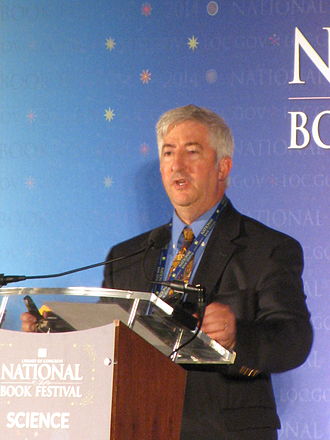Eric H. Cline

Eric H. Cline (born September 1, 1960) is an author, historian, archaeologist, and professor of ancient history and archaeology at The George Washington University (GWU) in Washington, DC, where he is Professor of Classics and Anthropology and the former Chair of the Department of Classical and Near Eastern Languages and Civilizations,[1] as well as Director of the GWU Capitol Archaeological Institute.[2] He is also the advisor for the undergraduate archaeology majors, for which he was awarded the GWU Award for “Excellence in Undergraduate Departmental Advising” (2006).[1] Cline is co-editor of the Bulletin of the American Schools of Oriental Research along with Christopher Rollston.[3]
Cline received his B.A. in Classical Archaeology at Dartmouth College in 1982 and his M.A. in Near Eastern Languages and Literatures at Yale University in 1984.
He was awarded a Fulbright scholarship (Greece) in 1989 and in 1991 received his Ph.D. in Ancient History from the University of Pennsylvania.
He has served as a Trustee and Board Member (in addition to holding various other offices) for both the Archaeological Institute of America and the American Schools of Oriental Research.[1]
Cline is an active field archaeologist with more than 30 seasons of excavation and survey experience in Israel, Egypt, Jordan, Cyprus, Greece, Crete, and the United States, including ten seasons at the site of Megiddo (biblical Armageddon) in Israel, from which he has retired after serving as Co-Director with Israel Finkelstein of Tel Aviv University.[1][4] He is currently Co-Director, with Assaf Yasur-Landau of the University of Haifa, of the renewed excavations at Tel Kabri, Israel, which have been conducted since 2005.[5] Recent discoveries by Cline and his team include the Near East’s oldest wine cellar.[6]
Considered for a Pulitzer Prize (2014), Cline has won awards for his books six times—he is a two-time winner of the American Schools of Oriental Research “Nancy Lapp Popular Book Award” (2014 and 2018)[7] and a three-time winner of the Biblical Archaeology Society’s “Best Popular Book on Archaeology” Award (2001, 2009, and 2011);[8] in addition, a volume that he co-edited won the 2019 G. Ernest Wright Award from the American Schools of Oriental Research.[9] He has also won both national and local teaching awards, including the national “Excellence in Undergraduate Teaching” Award from the Archaeological Institute of America (2005) and the GWU “Morton Bender Excellence in Undergraduate Teaching” Award (2004).[1] In addition, he has received the two highest awards given at GWU: one for teaching, the “Oscar and Shoshana Trachtenberg Award for Teaching Excellence” (2012),[10] and the other for scholarly research, the “Oscar and Shoshana Trachtenberg Award for Faculty Scholarship” (2011).[11] He is the first faculty member in GWU history to have won both awards. He has been nominated three times for the CASE US Professor of the Year (2008, 2009, and 2012). In May 2015, he was awarded an honorary doctorate from Muhlenberg College.[12] In July 2015, he was named a member of the inaugural class of NEH Public Scholars, receiving the award for his next book project entitled Digging Up Armageddon: The Search for the Lost City of Solomon, which was published by Princeton University Press in March 2020.[13] In Fall 2018, Cline was initiated into the world’s first Archaeology Fraternity, Delta Iota Gamma (“DIG”).[14] In May 2020, Cline was named a Getty Scholar for the 2020-21 academic year.[15]
